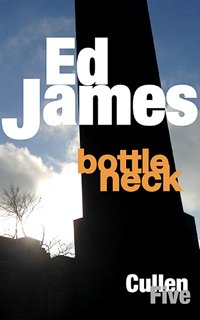
What lovers of police procedurals demand in their reading is a realistic portrayal of what it’s like to be a police investigator. But what happens when police procedures change in the real world? It’s a problem writers in Scotland have been facing since the establishment of Police Scotland a year ago. There are now 24,000 officers wearing a common badge and sharing more centralised resources.
Ed James (pictured) is an East Lothian author who’s been taking a close look at what the merging of Scotland’s eight forces has meant for the law enforcement professionals, and his new book Bottleneck is set to reflect the changes in detail. Working with his police contacts, he’s researched the changes to the Scottish police force anticipating that readers will want to read about new investigations under the Police Scotland set-up.

“The change-over has definitely altered the landscape for Scotland’s crime writers and I don’t think anyone writing contemporary police procedurals can avoid it much longer,” says James. “Like real life officers, our fictional equivalents are having to deal with the upheaval and all the conflicts that go with major operational change. I heard Ian Rankin saying he had side-stepped it in Saints of the Shadow Bible, but I think readers are going to expect the subject to be tackled more and more now so that’s why I decided to do so.”
Other writers who’ve led the way are Craig Robertson and Alex Grey. In their books Witness the Dead and The Bird That Did Not Sing, respectively, they’ve reflected the new regime. When Robertson wrote Witness the Dead, which was released last year, Police Scotland wasn’t yet fully formed. “I knew the book was going to be out after the major decisions were made, which was a bit worrying,” says Robertson. “Fortunately, I had a Scottish government contact who was involved in the actual process and I was able to get some information but I was making changes as I was going along. It was little things like where was the HQ going to be? What was going to be the colours of the cars?”
“A positive thing is the removal of boundary restrictions,” says Alex Gray. “Our crime fighters can now go wherever we choose, at the behest of imaginary senior officers. The police have been marvelous to me over the years, in terms of research and I think we need to move along with all the changes happening to them.”
Watch for Ed James’ Bottleneck, which is released tomorrow. In it, DC Scott Cullen, once part of the Lothian and Borders Police, investigates a murder case as part of the new single force. It’s the fifth book in the series.








Some Irish crime writers faced similar problems when the police force in Northern Ireland changed from the RUC to the PSNI in November 2001, with major reforms and restructuring after the ceasefires, decommissioning and the Good Friday Agreement.
thanks Mel